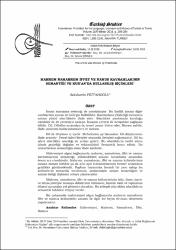| dc.contributor.author | Fettahoğlu, Selahattin | |
| dc.date.accessioned | 2019-12-17T13:33:44Z | |
| dc.date.available | 2019-12-17T13:33:44Z | |
| dc.date.issued | 2016 | |
| dc.identifier.issn | 1308-2140 | |
| dc.identifier.issn | 1308-2140 | |
| dc.identifier.uri | https://app.trdizin.gov.tr/makale/TWpnd09URTNOdz09 | |
| dc.description.abstract | İnsan konuşma yeteneği ile yaratılmıştır. Bu özellik insanı diğer canlılardan ayıran en belirgin farklılıktır. Kavramlara yüklediği meramını anlam yüklü sözcüklerle ifade eder. Sözcükler yardımıyla kurduğu cümleler ile de çevresiyle anlaşır. İnsanın çevresi ile iletişimini sağlayan dilidir. Dil, Dilbilim açısından üç temel unsur ihtiva eder. Meram sahibi, ifade (anlatım) kalıbı (sözcükler) ve meram. Dil ile düşünce iç içedir. Birbirinden ayrılamazlar. Dil düşüncenin ifade aracıdır. Temel işlevi bireyler arasında iletişimi sağlamaktır. Dil bu işlevi sözcükler aracılığı ile yerine getirir. Bu sözcüklerin tarihi süreç içinde geçirdiği değişim ve tekâmülünü Semantik konu edinir. Bu unsurlardan semantiğin alanı ifade kalıbıdır. Mahremiyet algısı bağlamında mahrem, namahrem, iffet ve namus kavramlarının semantiği, yüklendikleri anlamı tanımlama açısından önem arz etmektedir. Mahrem, namahrem, iffet ve namus kelimelerinin zaman zaman birlikte ya da ayrı ayrı kullanımlarında benzer anlamlara geldikler görülmektedir. Toplum hayatında önemli bir yere sahip bu kelimelerin semantik incelemesi, aralarındaki anlam benzerliğini ve anlam birliği ilişkisini ortaya çıkaracaktır. Mahrem, namahrem, iffet ve namus kelimelerinin lafız, ibare, işaret ve iktiza yönüyle manaya delaletinin bilinmesi, kişinin özeli ve toplumun düzeni açısından yol gösterici olacaktır. Bu sebeple zikredilen sözcüklerin semantik tahliline ihtiyaç vardır. Bu çalışmada mahremiyet algısı bağlamında mahrem namahrem iffet ve namus kelimelerin anlamı ile ilgili bir beyin fırtınası denemesi yapılacaktır. | en_US |
| dc.description.abstract | Human is created with speaking ability. This feature is the clearest differences between human and other creatures. Human express the intention of concepts by attributing meaning to the words. People can also communicate with others with sentences that created via words. Language is the tool that helps people to communicate with other people around them. Language comprise of three part in terms of linguistics. That's are person's intention, express structure and intention. Language within the thought. They are inseparable. Language is the means of expression of thoughts. The main function of them are supplying communication between individuals. This function is supplied with words. Semantic deal with change and development of these words in historic process. Expression from the concepts mentioned before, is the field of semantic. In the context of perception of privacy, the semantic of private, unrelated, virtue and pudicity concepts are important in the sense of describing their meanings. Private, unrelated, virtue and pudicity are sometimes in the same meaning when they use together or separately. The semantic analyses of these words, which are important in society life, will reveal meaning similarities and meaning unity among them. Knowing the word signification of private, unrelated, virtue and pudicity in terms of wording, expression, sign and requirement can be guide for individuals, society order and its design. Therefore, semantic analyses of these words are needed. In this study, brain storming will be done related to meaning of private, unrelated, virtue and pudicity words. | en_US |
| dc.language.iso | tur | en_US |
| dc.relation.ispartof | Turkish Studies (Elektronik) | en_US |
| dc.rights | info:eu-repo/semantics/openAccess | en_US |
| dc.subject | Mahremiyet | en_US |
| dc.subject | Mahrem | en_US |
| dc.subject | Namahrem | en_US |
| dc.subject | İffet | en_US |
| dc.subject | Namus | en_US |
| dc.title | MAHREM NAMAHREM İFFET VE NAMUS KAVRAMLARININ SEMANTİĞİ VE KUR'AN'DA KULLANILIŞ BİÇİMLERİ | en_US |
| dc.title.alternative | THE SEMANTIC OF PRIVATE, UNRELATED, VIRTUE AND PUDICITY CONCEPTS AND THEIR USAGE IN KORAN | en_US |
| dc.type | article | en_US |
| dc.relation.publicationcategory | Makale - Ulusal Hakemli Dergi - Kurum Öğretim Elemanı | en_US |
| dc.department | Gümüşhane Üniversitesi | en_US |
| dc.identifier.volume | 11 | en_US |
| dc.identifier.issue | 5 | en_US |
| dc.identifier.startpage | 269 | en_US |
| dc.contributor.institutionauthor | Fettahoğlu, Selahattin | |
| dc.identifier.endpage | 284 | en_US |


















